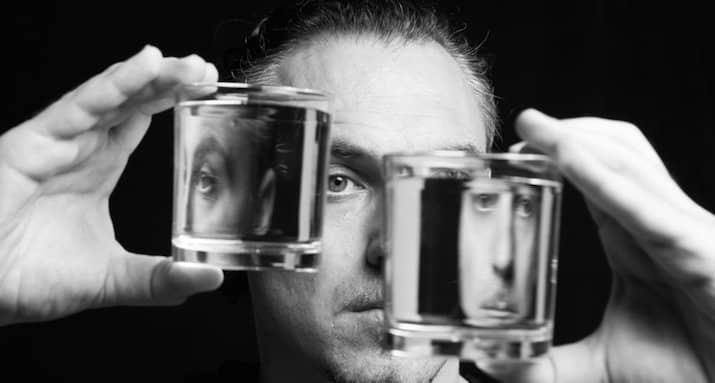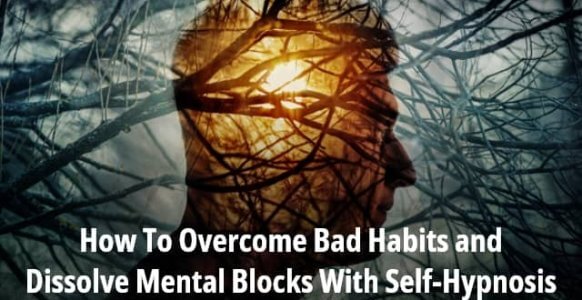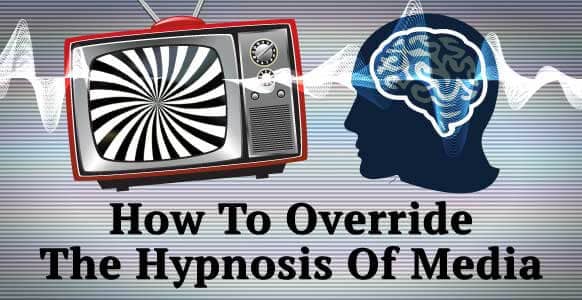
Ever been in two minds about something?
You probably have.
But it’s really just an expression.
A metaphor for those times when you’re having trouble making a decision between two possible options.
As the truth of the matter is, you’ve only got one mind.
So given this, you might be wondering why there’s all this talk about the conscious and the unconscious minds?
Doesn’t that suggest that there are two of them?
The short answer to this is, yes.
This is because explaining them as two separate minds makes it easier to explain something that is rather quite complex… Your mind.
The fact is, no one really knows what happens inside it.
What they do know is that it’s possible to predict certain outcomes in a given situation.
They can tell how the mind will respond to pain, stress, denial, and fatigue, for example.
To make it easier to grasp, they divide the brain’s functions into two parts… the conscious and the unconscious.
They’re really just separate functions of the same mechanism.
But by focusing on the functions, it’s possible to get a clearer picture of exactly what’s going on.
So let’s lift the lid and see what’s inside…
The Functions Of The Conscious And Unconscious Minds
The conscious mind is easy to understand.
In fact, you’re using it right now.
It’s your “waking” mind. The awareness of things you can focus on.
It’s able to deal with between 5-9 ideas or experiences at a time.
It’s the “here and now” mind that makes choices, makes plans, and helps you enjoy life.
The unconscious mind, though, is a different ball game.
Compared to the conscious, it’s enormous.
It holds all the memories, experiences, wisdom and insight you’ve gained over the years.
It runs everything that happens in your body (and mind).
And while the unconscious runs the show, it will take orders from the conscious mind.
If they’re presented in the right way. Which is usually in the form of suggestions.
Still confused?
It’s a complicated subject, isn’t it? Time for a metaphor…
Imagine that the subconscious mind is a gigantic cave full of treasures.
It’s massive, immeasurable… really big.
Full of ideas, dreams, inventions. Fantastic notions, bizarre thoughts, landscape paintings, piano sonatas.
And even the odd unpleasant thing.
The conscious mind, on the other hand, is like a little man with a flashlight.
Whatever the small beam of light hits on, that’s all he’s able to perceive.
Even with a massive flashlight, there’s a limit to what he can focus on.
If he tries to focus on too much at once, he’ll just get confused.
So the trick is to be able to navigate through the cave and find the things he needs when he needs them.
That’s what techniques such as hypnosis can help you do.
They let you explore the cave, find the treasure, and bring it into your conscious awareness.
And when you think about it like that, it’s really pretty cool.
To get an even better idea of what’s going on, let’s take it a step further.
Comparing The Conscious And Unconscious Minds
On a date with his new girlfriend, Callum found himself in trouble.
While talking to her about what they were going to do, he called her by his ex-girlfriend’s name.
Whoops!
You can probably guess what happened next…
But why did he do it?
Was Callum secretly still longing for his previous partner?
Was his unconscious mind telling him this new relationship wasn’t working out?
Or was he just an idiot?
Sigmund Freud said that the mind is like an iceberg.
The tip of the iceberg above the water represents the conscious mind. But the largest part, the part under the water, represents the unconscious.
It’s only an analogy, but it makes a lot of sense.
It explains how it’s possible for the unconscious to hold so much stuff.
All those thoughts, feelings, memories and urges.
It also explains how your unconscious mind is able to influence everything you do…
… even if you’re not consciously aware of it.
So for whatever reason, Callum’s unconscious mind took control.
It put him in an awkward situation.
And even though he might not have admitted it at the time, there was probably a good reason behind it.
Nice story, and you’ve probably heard similar stories before. But they don’t tell you much.
Instead, you need to examine these two “parts” of your mind in a direct comparison.
What The Conscious Mind Can Do
The conscious mind can juggle 5-9 different things at once.
That’s 5-9 bits of information. 5-9 activities. Or a mixture of both.
Guess you could call it multi-tasking.
When the word “conscious” is used, it refers to the logical side of your brain. The side that analyzes everything, criticizes everything, and works in a linear way.
It’s in control of your thinking while you’re awake.
It’s in control of your voluntary movements.
It’s in use whenever you speak.
It powers your deliberate actions and enables you to choose goals.
It’s the system you use when acquiring academic knowledge.
It follows a sequential and logical pattern, whether that’s a thought pattern or a pattern of action. That’s what happens, for instance, when you’re trying to understand or work through a problem.
It’s only aware of the here and now, and only experiences events in the present.
And just like the little flashlight guy, its focus is limited.
So how is the unconscious different?
A simple way to sum it up would be to say that it does everything else.
But let’s get more specific than that.
What The Unconscious Mind Can Do
The unconscious can deal with all the information your conscious mind can’t handle.
That’s everything you’re experiencing or dealing with on top of the 5-9 things your conscious mind can cope with.
Sort of multi-multi-multi-tasking.
It’s capable of absorbing and sorting through layer after layer of stuff.
When the word “unconscious” is used, it refers to the intuitive side of your brain. The side that’s involved with memory, imagination, creativity and expressiveness.
It doesn’t analyze or criticize, it just soaks it all up. It takes a holistic view, unlike the conscious mind’s limited linear approach.
It’s where your feelings and perceptions emanate from.
It’s in control of your involuntary movements.
It contributes to your non-verbal communication.
It powers your automatic behaviors like breathing and helps you achieve goals.
It’s the system you use to acquire knowledge from your experiences.
It’s capable of simultaneous thought and action. While your conscious mind searches for answers to problems, it’s your unconscious mind that finds them.
It’s aware of the past and the present and can deal with both of them at the same time.
It’s the storehouse of all your memories and experiences, and records absolutely everything you do.
And like the humongous cave in the example above, it has an almost limitless capacity.
That’s all fascinating stuff, but it gets even more interesting.
You see, these two “minds” aren’t separate entities. They’re part of the same mechanism.
And that means they work together, side by side, to help you make sense of the world.
How Your Two “Minds” Make Things Work
Imagine you’re driving your car along the freeway.
You don’t have to concentrate on what you’re doing, do you?
You’ve done it plenty of times before.
The whole process has become automatic, and you do it without even thinking about it.
When you learned how to drive, you did it by acquiring academic knowledge.
Knowledge about the parts of the car. Knowledge about speed limits. Knowledge about using the road.
All that knowledge got stored in your brain (can you guess where?). And whenever you want to use it, it’s there, ready and waiting.
Remember this familiar saying?
“Once you learn how to ride a bike, you never forget.”
If you’ve ever driven a bike, you’ll know it’s absolutely true.
But why?
Simple. You used your conscious mind to learn how to ride a bike. That was academic knowledge you had to acquire.
But now, you already have that knowledge. It’s stored deep within your subconscious.
So all you have to do to ride a bike again, is access it.
And it works. Just ask anyone who’s ever ridden a bike, or driven a car, or learned how to ice skate.
Or learned to speak a second language. Or to play the piano.
You never forget.
You might get rusty, but that’s just lack of practice.
The skills you need are still there, waiting for you whenever you need them.
And it’s all thanks to something we find it almost impossible to explain!
With power like that just sitting there, inside your head, is there anything you can’t achieve?
Basically, everything you’ve ever experienced or learned is stored, ready for you to tap into.
The trick is to be able to tap into what you need, when you need it.
One of the easiest ways to do it is through hypnosis.
That might be a session of hypnotherapy, or it could just as easily be done using self-hypnosis.
Either way, who knows how far it might take you?








![Yogic Breathing For Hypnosis: 3 Easy Techniques To Ground & Relax Your Clients Before Inducing A Hypnotic Trance [Includes Infographic] Yogic Breathing For Hypnosis: 3 Easy Techniques To Ground & Relax Your Clients Before Inducing A Hypnotic Trance [Includes Infographic]](https://hypnosistrainingacademy.com/wp-content/uploads/2019/05/yogic-breathing-for-hypnosis.jpg)




![[ADVANCED GUIDE] How To Master Hypnotic Regression Therapy - Part I: Essential Principles To Profoundly Transform Your Subject’s Emotional Trauma [ADVANCED GUIDE] How To Master Hypnotic Regression Therapy - Part I: Essential Principles To Profoundly Transform Your Subject’s Emotional Trauma](https://hypnosistrainingacademy.com/wp-content/uploads/2016/09/hypnotic-regression-therapy-essential-principles.jpg)
